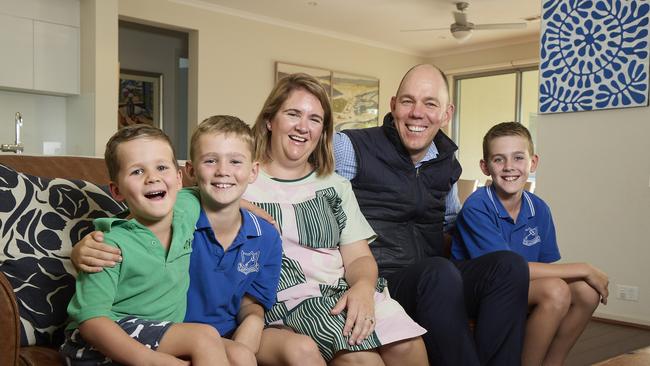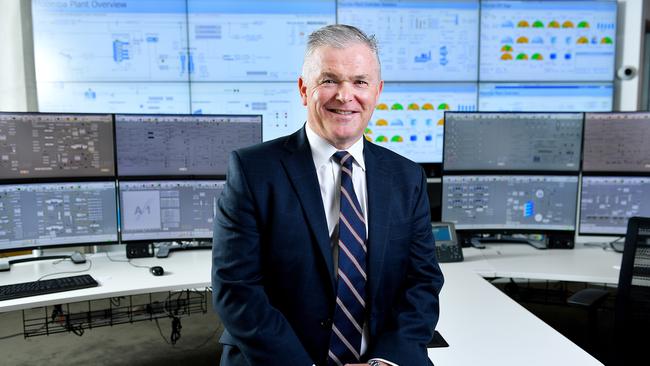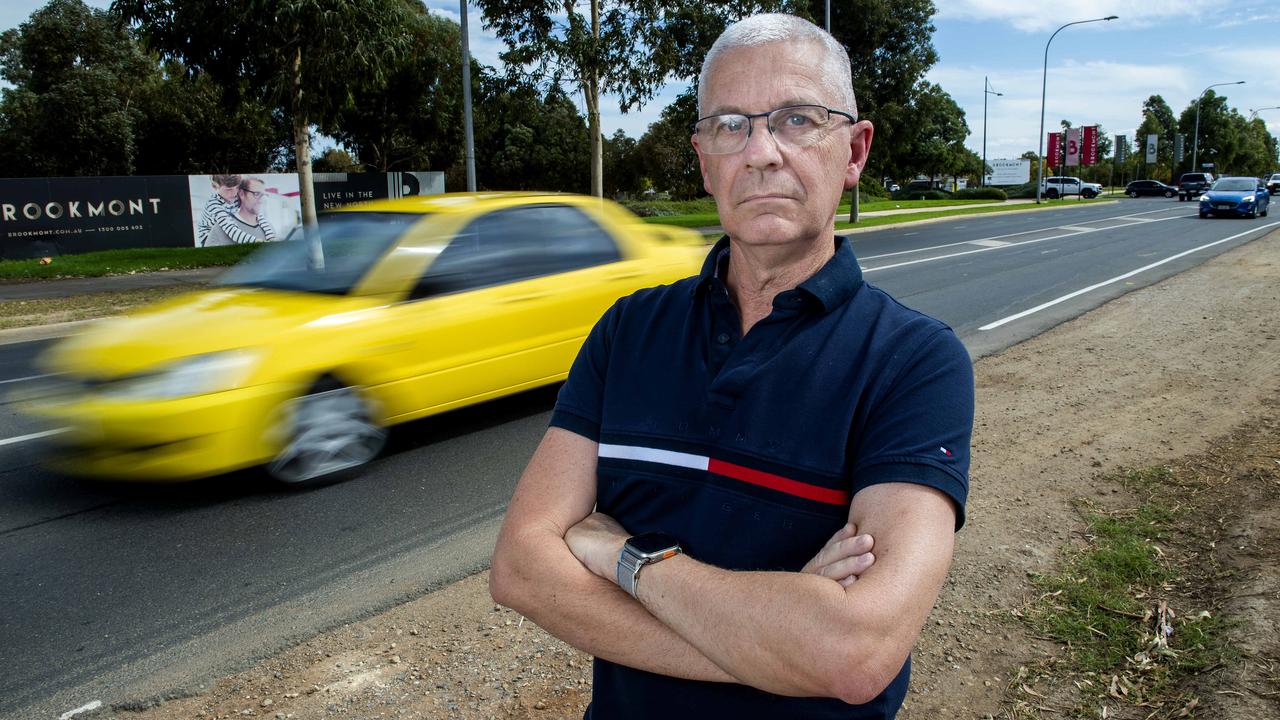Santos trials nine-day fortnight for better wellbeing for staff | Jessica Adamson
How does a nine-day fortnight for the same pay sound? SA’s biggest company, Santos, is trialling the scheme, writes Jessica Adamson. Would you like it offered where you work?
SA News
Don't miss out on the headlines from SA News. Followed categories will be added to My News.
South Australia’s biggest company, Santos, is trialling a nine-day fortnight.
The global energy company, which employs about 4500 staff excluding contractors, is among the first big name firms to break the traditional working mould in a bid to improve staff wellbeing while increasing productivity and talent retention.
The bold trial, which began last month and has been extended to May, has largely gone under the radar. Santos managing director Kevin Gallagher admits he wasn’t initially sold on the idea.
“You can imagine a dinosaur like me takes a bit of convincing to do something like this,” he says.
“It’s a brave step, you’re basically shutting down your office for one day a fortnight.”
Brave but brilliant, and this is why.
If the pandemic taught us anything it’s that flexible working arrangements don’t necessarily mean a decrease in productivity or profit. In fact, in many cases, it’s quite the opposite. A nine-day fortnight can mean fewer sick days, a better work/life balance and improved wellbeing for employees.
2022 has been described as the year of exhaustion and Mr Gallagher recognises his workforce is weary.
“You could see in the eyes of people that they were tired,” he says.
“And just like an athlete, they cannot perform without recovery time. Our executives can’t perform at their best without allowing them time to detox and de-stress.

“Our organisation is only successful if we’ve got good people.”
“Our people work really hard in a tough industry, it’s about allowing them some rest and recovery time on an ongoing basis.”
Don’t be fooled. Mr Gallagher is the not the type of leader to oversee a major shift like this without a benefit to the company and the figures to back it up. With an AGM just days away, he knows shareholders will be watching carefully and asking plenty of questions.
But at a time of enormous community pressure, as the world reduces its reliance on fossil fuels and Santos transitions to deliver clean fuels, Mr Gallagher knows something had to give. His company is in the eye of a storm and his people need to be focused and energised.
His team spent much of last year studying global models, including companies who have two teams of alternating workers, allowing the office to be constantly staffed.
Santos built its own nine-day-fortnight model tailored to suit unique needs. Almost 2500 of their full-time Australian office-based workers are now choosing to work condensed hours across a fortnight, culminating in a day off at the end – a Flex Friday.
Integrated planning manager Lucia Walsh is one of them.
The mother of three, who is based at the Flinders St headquarters, has been with the company 12 years.
“I have three young boys so having the flexibility to plan ahead knowing I’ll have that day to get things done is very helpful,” she says.

“My team is getting just as much, if not more, work done and it allows me to organise the working week knowing that I can use that day to focus on our family.”
If the trial’s successful, and the early signs are overwhelmingly positive, it’ll be implemented from November through to April so Santos staff can make the most of the warmer months. It’s already in place for their Alaskan colleagues. There’s no impact to salary or leave entitlements. It’s full pay with every second Friday a day of freedom.
“Whether you want a long weekend or you want repairs done at the house – you can plan for that and be home,” Mr Gallagher says.
As much as they can, staff are being encouraged to schedule meetings from Monday through to Thursday. Let’s face it, there are far too many of them anyway.
Not everyone can partake – their roles simply don’t allow it – but many of the staff who can’t are finding every second Friday now has fewer interruptions. That’s a win for them.
The trial’s success will be carefully measured with a review of business productivity along with KPI’s, surveys and regular feedback from leaders and participants.
“If we don’t get the productivity results then we wouldn’t go forward with it,” Mr Gallagher says. “The proof will be in the eating of the pudding, but the early signs are very positive. I hope we can keep it going.”
Every business leader knows that finding staff right now is an enormous challenge. Keeping staff is just as difficult. Santos hopes its progressive move will build loyalty.
“If we can have a better retention record than the rest of the industry then that’s a competitive advantage for us,” Mr Gallagher says.
“These are the sort of things that make it easier for people to work at Santos.
“You’ve got to move with the times and be prepared to test your own values and views and I’m prepared to do that.”
Santos isn’t the first to break ground here and it certainly won’t be the last. Defence and security company BAE Systems offered a nine-day fortnight to workers on its Hunter-class frigate program in 2021. There are two shifts to ensure continuity. And accounting firm Grant Thornton introduced a nine-day fortnight trial earlier this month, declaring the current system is “broken”.
“We see an irresistible opportunity to improve quality, client service and our people’s wellbeing.” chief executive Greg Keith says.
A nine-day fortnight won’t work for every industry. While it might suit professional services, a hospitality business for example may find it more difficult to navigate. But it’s the happy medium between burnout and excessive time off.
Oxfam Australia is offering its workers a four-day week at the same pay, in a landmark trial. I’m not a fan. If Thursday becomes the new Friday every week in this country, we’re in trouble. Many will take it for granted and it’s tough to reverse it if things don’t work out.
That’s not to say it can’t and won’t happen eventually, but we need to work towards it slowly and methodically. Most of the recent trials done in Ireland, Canada, the US and UK have been positive – but it’s early days.
And it’s possible the Hawthorne effect has played a part. That name comes from a 1930s experiment with Illinois factory workers that showed their awareness at being studied caused them to modify their behaviour and therefore productivity levels.
So, what if that’s the case at Santos? Mr Gallagher says, if productivity levels dip or even plateau, it’s back to the drawing board. For now, though, it’s full steam ahead and the beginning of something big at our biggest company.
Mr Gallagher credits the team that built the Santos model.
“They didn’t give up, there’s many hurdles. The first response you’ll often get is no bloody way, we’ll end up with a loss of productivity and higher costs,” he says. “I’m proud of the fact they had the resilience and determination to do the hard yards and to challenge the dinosaur like me to get it across the line.”
With brave leadership like this, I get the feeling this dinosaur will be around a long time.



